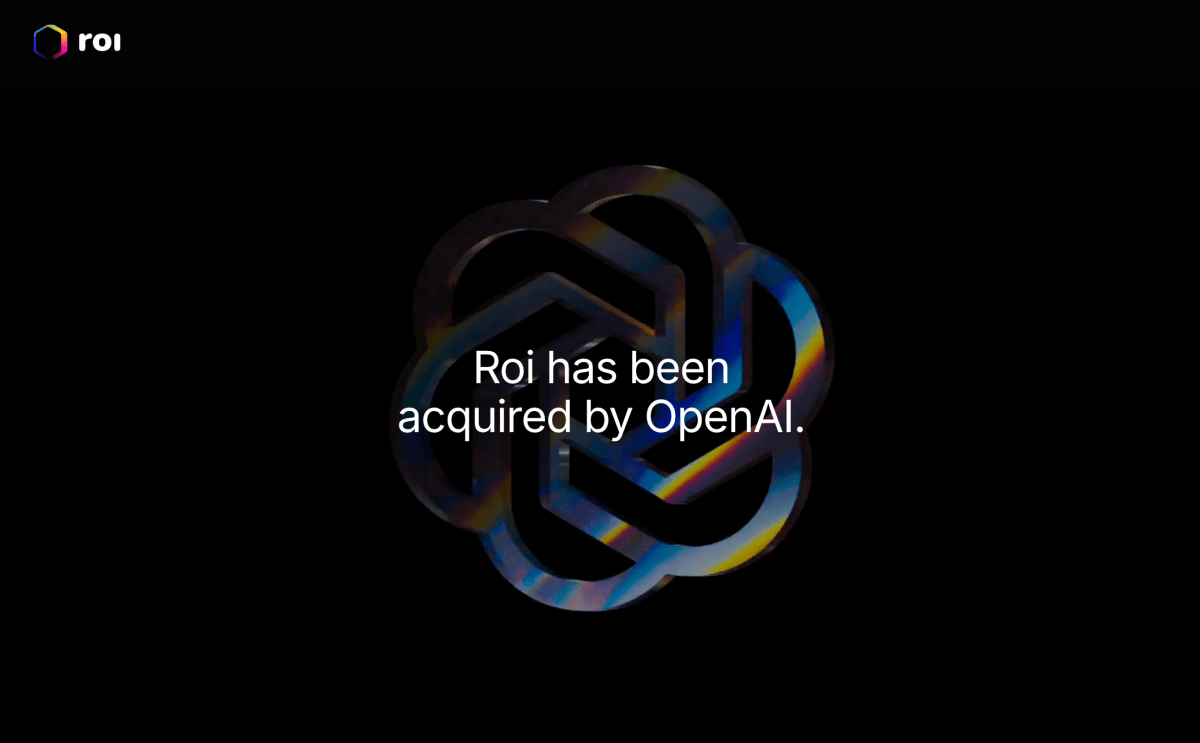OpenAI has acquired Roi, an AI-powered personal finance app. In keeping with a recent trend in the AI industry, only the CEO is making the jump.
Chief executive and co-founder Sujith Vishwajith announced the acquisition on Friday, and a source familiar with the matter told TechCrunch he is the only one of Roi’s four-person staff to join OpenAI. Terms of the deal were not disclosed. The company will wind down operations and end its service to customers on October 15.
The Roi deal marks the latest in a string of acqui-hires from OpenAI this year, including Context.ai, Crossing Minds, and Alex.
While it’s not clear whether any of Roi’s technology will transfer over to OpenAI or which unit Vishwajith will join, the acquisition clearly aligns with OpenAI’s bet on personalization and life management as the next layer of AI products. Roi brings a specialized team that has already tried to solve personalization in finance at scale — a challenge whose lessons can be applied more broadly.
New York-based Roi was founded in 2022 and has raised $3.6 million in early-stage funding from investors like Balaji Srinivasan, Spark Capital, Gradient Ventures, and Spacecadet Ventures, according to PitchBook data. Its mission was to aggregate a user’s financial footprint, including stocks, crypto, DeFi, real-estate, and NFTs, into one app that can track funds, provide insights, and help people make trades.
“We started Roi 3 years ago to make investing accessible to everyone by building the most personalized financial experience,” Vishwajith wrote in a post on X. “Along the way we realized personalization isn’t just the future of finance. It’s the future of software.”
Beyond tracking trades, Roi gave users access to a financially savvy AI companion that responded in ways that made sense for them. When signing up, users could personalize Roi by providing information like what they do for a living and how they wanted Roi to respond to them.
Techcrunch event
San Francisco
|
October 27-29, 2025
In one telling example that Roi posted on X, the sample user wrote: “Talk to me like I’m a Gen-Z kid with brain rot. Use as little words as possible and roast me as much as you want I don’t mind.” In response to a query about the status of the user’s portfolio, Roi replied: “Suje, you got cooked lil bro. Cause of the tariff announcements, you took an L today of $32,459.12…Based on your risk preference this might be an opportunity to buy the dip.”
The exchange highlights the philosophy behind Roi and its co-founder — that software shouldn’t just provide generic answers but should adapt, learn, and communicate in ways that feel personal, human, and most importantly, keep you engaged.
As the Roi team wrote in a blog post: “The products we use every day won’t remain static, predetermined experiences. They’ll become adaptive, deeply personal companions that understand us, learn from us, and evolve with us.”
That vision dovetails with OpenAI’s existing consumer efforts, including Pulse, which generates personalized news and content reports for users as they sleep; the Sora app, a TikTok competitor filled with AI-generated content, including personal cameos from users; and Instant Checkout, a feature that lets users shop and make purchases directly in ChatGPT.
The deal also comes as OpenAI beefs up its consumer applications team, led by former Instacart CEO Fidji Simo. It’s a further signal that OpenAI isn’t just trying to be an API provider, but wants to build its own end-user apps. Roi’s talent and tech could slot right into these apps and help make them more adaptive.
Vishwajith, alongside his co-founder Chip Davis, used to work at Airbnb, where he developed a knack for optimizing user behavior to drive revenue. By his account, a simple change of 25 lines of code led to $10+ million in additional cash.
Being able to bring in meaningful revenue via consumer apps is more important than ever to OpenAI as it continues to burn through billions on data centers and infrastructure to power its models.





